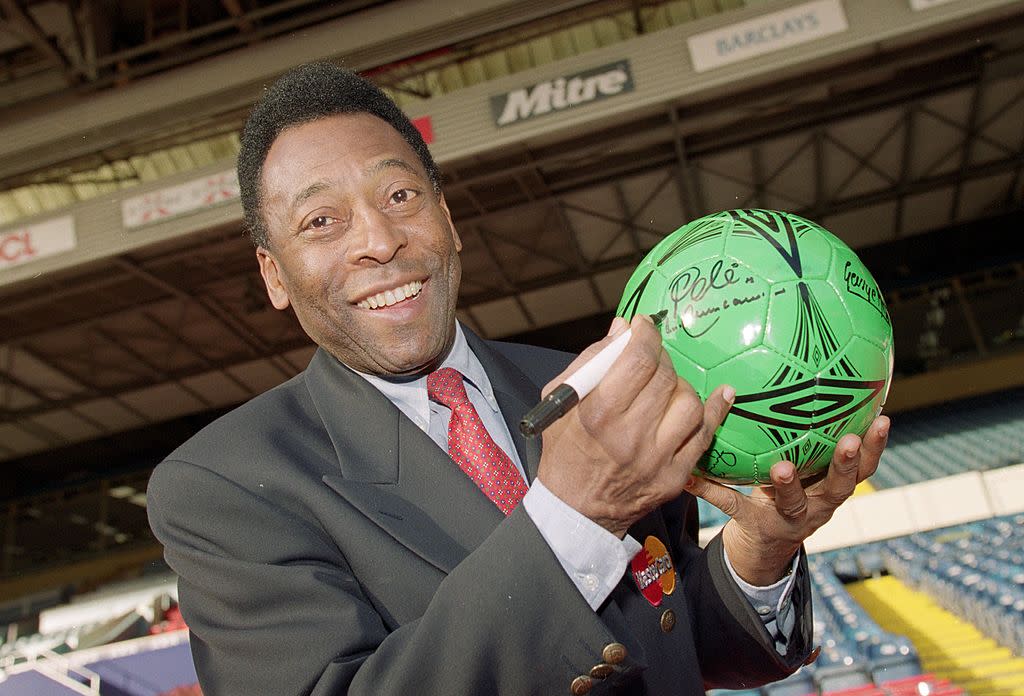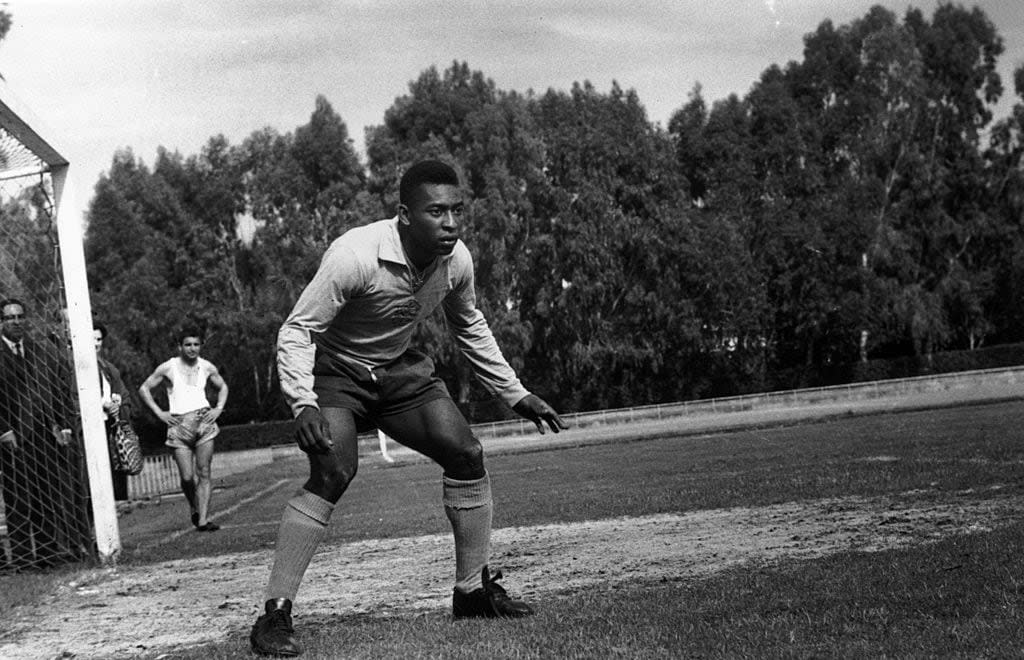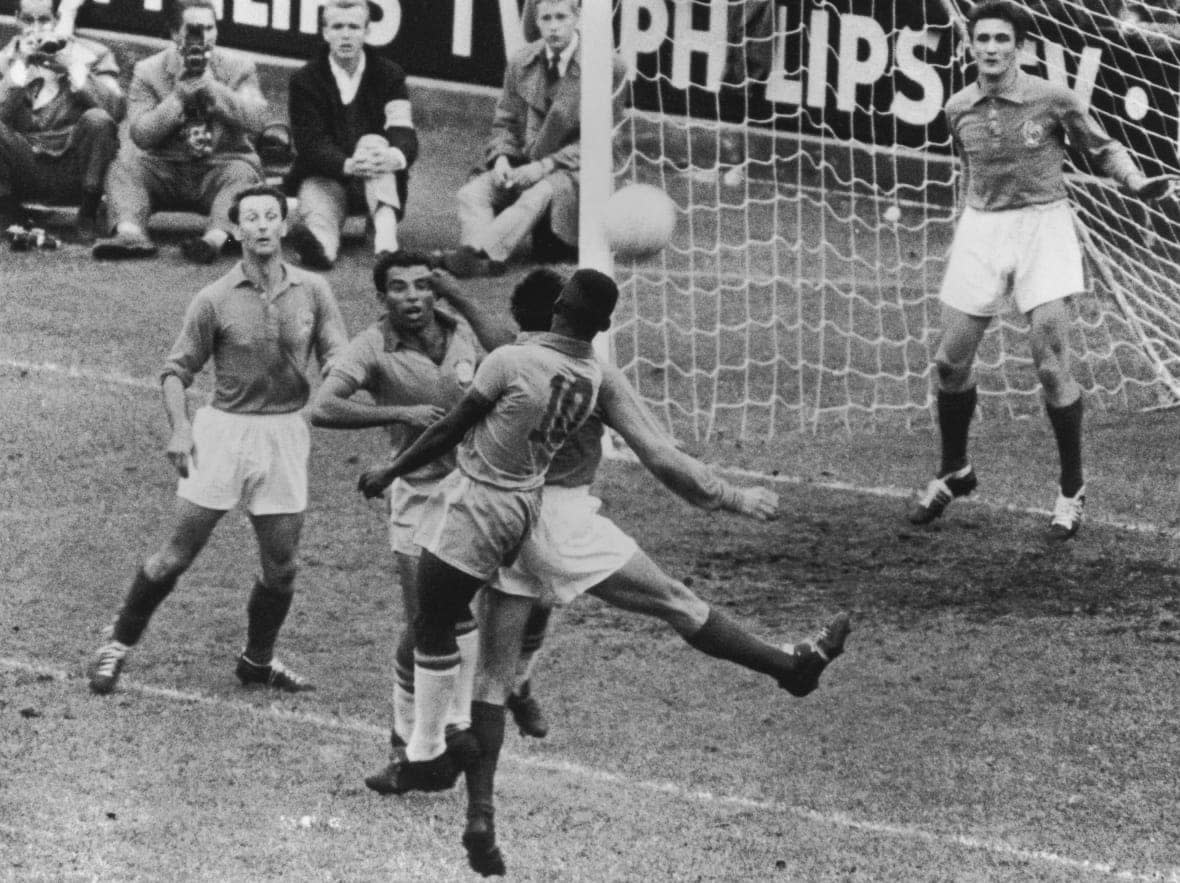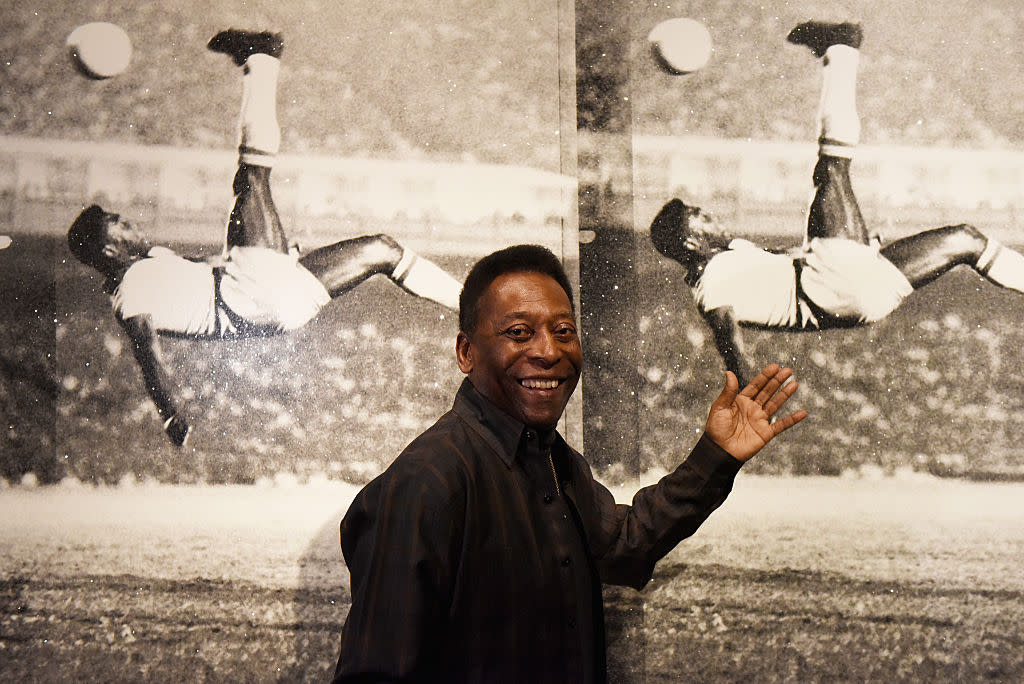Soccer legend Pelé has died at 82
Named the greatest soccer player of all time by FIFA, Pelé has been known for his electrifying style of play since his debut as a young teen.
The Brazilian superstar forward possessed a penchant for spectacular scoring and anticipating his opponents’ movement on the field — all of which changed the game forever. He was the country’s all-time leading scorer, helping the club win three World Cups in 1958, 1962 and 1970. He’s the only player to take home the gold trophy three times.

Upon his retirement in 1977, he became one of the most prolific voices and ambassadors for the game. “I was born for soccer, just as Beethoven was born for music,” Pelé once said in the book, “The Measure of Greatness.”
The soccer legend died Thursday at age 82. His agent, Joe Fraga, confirmed his death, according to the Associated Press.
Pelé had been battling colon cancer since September 2021 and was hospitalized in late November to re-evaluate his treatment, according to ESPN. His daughter, Kelly Nascimento, posted a picture of her holding her father’s hand in his hospital room while watching the 2022 World Cup, the preeminent event of the sport dubbed “the beautiful game,” a phrase Pelé helped popularize. In late December, his condition worsened, and he was under “elevated care” to address kidney and cardiac dysfunction.
The Younger Years
Pelé, who was born on Oct. 23, 1940, showed a true knack for soccer at a young age. His father Joao “Dondinho” Ramos was the first to groom his skills. Ramos struggled to make a living as a club player himself.

Pelé was the first child of Ramos and Dona Celeste, who named their son Edson Arantes do Nascimento. School friends gave him the Pele nickname after he mispronounced the name of his favorite player, Vasco da Gama goalkeeper Bilé. Pelé first hated the nickname, but the more he complained about it, the more it stuck.
He grew up in poverty in Bauru in the state of São Paulo, earning extra money in tea shops as a servant. Under his father’s tutelage, Pelé developed his sharp skills for the game by kicking a rolled-up soccer ball stuffed with rags around the streets of Bauru.
By his early teens, Pelé joined a youth soccer squad that Waldemar de Brito coached. He played on the Brazilian national soccer team. Recognizing the boy’s talents, De Brito urged Pelé’s parents to allow their son to try out for the Santos professional soccer club. At 15, he would make his professional debut as a member of the Santos squad, leading the league in goals during his first full season. By 16, he was a member of the Brazilian national team.
At 17, Pelé officially hit the world stage during the 1958 World Cup in Sweden. He was then the youngest player in World Cup history. In the semi-final round against France, he scored three goals in a 5-2 victory. In the finals, he made two goals in another 5-2 win over the host country.
‘A National Treasure’
Now dubbed “The King,” Pelé would receive lucrative deals from European clubs following his epic performance. By 1960, he had scored more than 230 goals in just over 210 games for Santos. Brazilian President Janie Quadros thwarted the efforts of the European clubs by pushing legislation that declared Pelé a national treasure — a law that forbade the new star from playing for the wealthy European teams.
Santos toured the world playing in lucrative exhibition games, taking full advantage of its star player’s popularity among fans. For instance, he and his Santos teammates traveled to Nigeria amid the civil war in 1969. The two factions agreed to a 48-hour cease-fire to allow all to watch Pelé in the exhibition game.
Pelé’s rise in soccer came with various physical challenges. During the 1962 World Cup in Chile, he aggravated a groin injury, forcing him to sit out the final rounds. And four years later in England, he was sidelined with leg injuries following a series of brutal attacks by opposing defenders. Pelé was so disappointed by the foul play that he vowed to never play World Cup soccer again. Yet, he returned in 1970 with a star-studded team, including Roberto Rivelino, Carlos Alberto Torres and Jair Ventura Filho aka “Jairzinho.”
Pelé officially announced his retirement in 1974. In 1975, however, he signed a three-year, $2.8 million contract with the New York Cosmos of the North American Soccer League to promote the game in the U.S. He retired after leading the Cosmos to the league championship in 1977, playing against his former club, Santos.

In his career, Pelé scored 12 goals in 14 World Cup games. He holds the Guinness World Record for his 1,279 goals in nearly 1,400 games. Most of all, his style of play and fair sportsmanship remade the game. He possessed great timing and accuracy that threw off his opponents’ balance. Further, he was superb at striking the ball with either foot.
“To watch him play was to watch the delight of a child combined with the extraordinary grace of a man in full,” Nelson Mandela once said of him.
Michel Platini, former UEFA president and French soccer phenom, said, “There’s Pelé the man, and then Pelé the player. And to play like Pelé is to play like God.”
Life After the ‘Beautiful Game’
Pelé continued to make his mark in retirement. In 1978, he received the International Peace Award. He was named Athlete of the Century by the French sports publication, L’Equipe, in 1980. The International Olympic Committee bestowed that same honor in 1999. Also in 1999, Time magazine named him one of the “100 Most Important People of the 20th Century.”
In 2014, Pelé was awarded his first-ever FIFA Ballon d’Or Prix d’Honneur, which acknowledged his contribution to the sport. The prize emerged from the 2008 merger of the FIFA World Player of the Year and Ballon d’Or (an award from the weekly sports magazine, France Football.) In 2015, France Football took a closer review of its past awardees to determine the players who would have won the award if it had been open to all since 1956 at its inception. Its research showed that Pelé would have received it a record seven times.
In 2014, the city of Santos opened the Pelé Museum, displaying over 2,000 items of memorabilia.
Outside of his sports accomplishments, Pelé had published several best-selling autobiographies and starred in successful documentaries and semi-documentary films. He also composed numerous musical pieces, including the soundtrack for the film, Pelé (1977). In 1992, Pelé was appointed a UN ambassador for ecology and the environment. He was also appointed a UNESCO goodwill ambassador.

Pelé is survived by his third wife, Marcia Aoki, and six of seven children from prior marriages and relationships. They are Kelly Cristina Nascimento, Edinho Nascimento, Jennifer Nascimento, twins Joshua and Celeste Nascimento, Flavia Christina Kurtz Nascimento. Sandra Regina Machado predeceased him.

Monée Fields-White is an award-winning writer and journalist based in Los Angeles. She has produced a broad spectrum of stories on a national and global scale for leading publications and nonprofit organizations in the four largest markets—Washington, D.C., New York, Chicago and Los Angeles. She can be found on Twitter and LinkedIn.
TheGrio is FREE on your TV via Apple TV, Amazon Fire, Roku, and Android TV. Please download theGrio mobile apps today!
The post Soccer legend Pelé has died at 82 appeared first on TheGrio.
